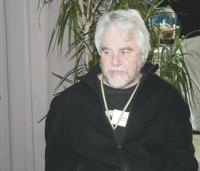Features
Cecily McNeill
10 November 2011
Life for people with disabilities has changed ‘hugely’ in the past 40 years with more enabling legislation and a far greater awareness of the issues, but the medical profession still lags behind.
 Dr Martin Sullivan of Massey University’s sociology department says a doctor asked a friend of his during a consultation over some major health issues whether she wanted her wishes to be resuscitated in the event of a major mishap recorded and she replied, ‘Of course I do’. A subsequent visit to another doctor revealed that the first doctor had put ‘Do Not Resuscitate’ on her record despite her advice to the contrary.
Dr Martin Sullivan of Massey University’s sociology department says a doctor asked a friend of his during a consultation over some major health issues whether she wanted her wishes to be resuscitated in the event of a major mishap recorded and she replied, ‘Of course I do’. A subsequent visit to another doctor revealed that the first doctor had put ‘Do Not Resuscitate’ on her record despite her advice to the contrary.
Dr Sullivan who lectures in disability issues says there is some debate over the instruction and the first doctor may have been influenced by a lack of success in resuscitating people who are harmed in the process, but to not discuss the matter further with his patient was unfortunate.
Human rights legislation in 1993, the NZ Disability Strategy and New Zealand’s ratification of the United Nations Convention on the Rights of People with Disabilities have increased awareness of the issues and ‘the world has got a lot less disabling’, but there is still a way to go.
‘I see myself as a person who has an impairment – a spinal cord injury – but that doesn’t disable me. What disables me is social response and barriers to my getting about in society be they built or attitudinal barriers.’
He says there is a negative social response to impairment which ‘creates disability in the same way that negative social response to females creates sexism or to brown skin creates racism’.
Dr Sullivan who spoke at a euthanasia conference in Wellington earlier in the year says many doctors don’t have anything to do with disability or disabled people apart from what they have read in text books or learned at medical school. They are trained in how to make people well, to get their bodies in the best working order.
‘So when they’re confronted with someone with severe impairment, there’s a real cognitive dissonance set up in their minds. They say to themselves, “If I keep this person alive, they’re going to be dependent, they’re going to need someone to dress them and toilet them.”
Disability activists say a better way to think about dependence or independence is that in modern society we’re all interdependent, because no one can be independent.
‘Provided a disabled person has involvement in determining how they are washed and dressed, who does it and what clothes they are put in, we see that as no worse than having to ask a technician to repair your tv.’
Image: Dr Martin Sullivan, right, at The Euthanasia Debate – Why Now? conference in Wellington in April.
See also: ‘Calls for legalisation of euthanasia refuted’
Link: The dangers of euthanasia – New Zealand Catholic Bishops